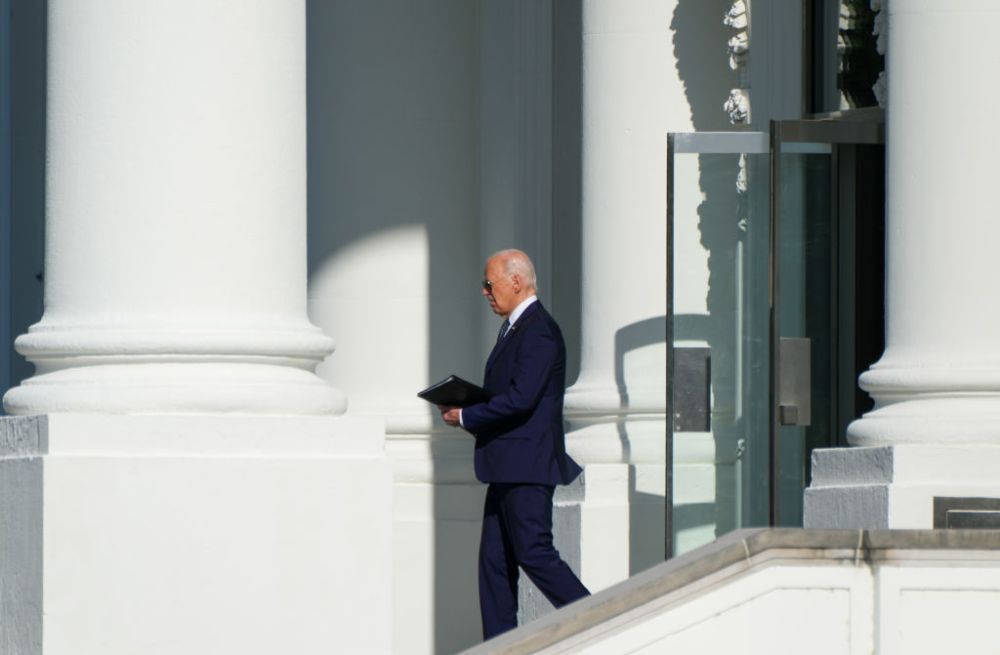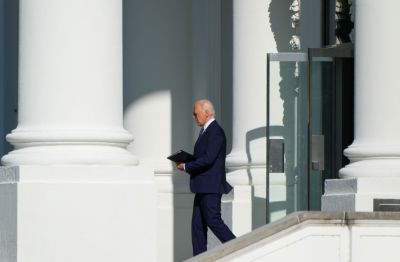Hello and happy Saturday. If you had told me two weeks ago—fresh off his damaging debate performance—that the fate of President Joe Biden’s candidacy would remain uncertain today, I … okay, I’d have believed you. It’s been that kind of a campaign season.
Last week I wrote to you the day after Biden’s ABC News interview, in which the president performed better than he had in the debate but did little to quiet concerns about his fitness. That middling performance laid the groundwork for a chaotic week: A number of congressional Democrats called on the president to withdraw, swing-state polling numbers trended toward Donald Trump, reports surfaced that Biden is shrinking his inner circle, and other reports indicated that some Democrats have had concerns about Biden’s age for years.
Your best guide for the winding and twisting journey that was the past week is Nick. On Tuesday, all signs pointed to Joe Biden staying in the race and Democrats not doing anything about it. And he drew an obvious parallel: the GOP’s capitulation to Donald Trump in 2016. But the analogy is not perfect, he argued in Boiling Frogs. Voters knew what they were getting in Trump and voted for him in the primaries anyhow. But Biden’s team had worked hard to hide the extent of the president’s decline from voters: “A conspiracy of silence around Joe Biden, orchestrated at the highest levels, deceived primary voters into believing that he was both fit to govern and remained their best hope for holding the presidency.”
But then on Wednesday, cracks begin to emerge. A few Democrats spoke out asking Biden to withdraw. Others, though, expressed concern anonymously to reporters but wouldn’t put their names out there. Nick notes (🔒) that a state party chair told NBC News, “I wish I was more brave. … I would be crucified by [Democratic leaders] if I spoke out of line.” Consider Nick unimpressed:
Trump’s party is governed by fear, political and physical. That doesn’t excuse the cowardice of Republicans, but it does help explain it. … Democrats have no such excuse. Antifa isn’t going to leave a pipe bomb on a congressman’s doorstep if he insists Joe must go. Compared to Republicans, the cost of political bravery to Democrats is very low.
By Thursday, Nick was feeling, dare I say, a little optimistic: “I think Democrats stand a decent chance of foiling the hostage crisis he’s created.” He lists the big-name Democrats who’ve expressed doubts in one way or another—Barack Obama declining to endorse Biden’s decision to stay in amid and maneuvering behind the scenes, Vermont Sen. Peter Welch calling on Biden to drop out, donors retreating—and says “a virtual smoke-filled room has begun to fill up.” One key difference from the days of such back-room negotiations to determine nominees? This one has been led from the bottom up. He writes:
“Democratic voters—and the wider public—have been screaming for a different nominee for the better part of two years. The hoi polloi don’t want him and haven’t for a long time. It was the president’s many “elite” friends in Washington who circled the wagons around him and kept him viable politically, perhaps out of foolish personal loyalty, perhaps because they underestimated Trump’s chances, or perhaps because they’re far more comfortable with a second Trump presidency than people like me would like to believe.”
I don’t normally turn this newsletter over to one writer, but Nick was dialed in this week and following the hour-by-hour changes in this chaotic but monumental moment. That’s hardly the only work we did on this story, though.
Ahead of this week’s NATO summit, Charlotte reported that European leaders had expressed concerns about Biden’s fitness, which are compounded by the fact that most would prefer a Biden reelection to the prospects of another Trump administration.
All eyes were watching Thursday when Biden did a press conference at the summit. His performance was on par with the ABC News interview: He displayed competence at times but struggled with some of his responses. Dispatch Politics reported on the reaction to that in Friday’s newsletter, saying that it wasn’t enough to “stanch the bleeding of support from Democratic doubters that include veteran political operatives, wealthy campaign donors, and many of his allies in Congress. Immediately following the roughly hour-long news conference … still more Democratic lawmakers issued statements lauding Biden’s accomplishments but calling on him to withdraw from the race against Trump.”
And that is where we stand now. The coming week promises to be a busy one: While the uncertainty about Biden’s campaign lingers, the Republicans head to Milwaukee for their convention. Dispatch Politics will be on the scene, as well as Steve and Jonah. Be on the lookout for our daily coverage.
Thanks for reading, and have a great weekend.
We’ll learn who Donald Trump’s running mate is this coming week, but right now Ohio Sen. J.D. Vance appears to be the frontrunner. In this profile, John explains how the onetime Trump critic earned the favor of a man who values loyalty above all else. Vance started with humility, begging for forgiveness. Then he used his connections to gain an audience with Trump at Mar-a-Lago, where they apparently hit it off. John details Vance’s journey from Yale Law School student to Hillbilly Elegy author to senator and now vice presidential frontrunner. And he discusses the many issues Democrats are likely to raise: Vance’s opposition to Ukraine aid, his position on abortion, and his stance on the 2020 election and January 6. John writes: “A Vance VP nomination presents the prospect not just of gambling on Trump for another four years, but of potentially handing the Republican Party over to postliberalism for a generation.”
If you can never remember exactly what the heck “Chevron deference” is when you see the term bandied about in Supreme Court coverage, I have good news: It’s no longer a thing. But until earlier this month, Chevron deference was a doctrine established in a 1984 SCOTUS ruling stating that judges should adhere to a federal agency’s interpretation of a regulatory statute if it is reasonable. Why was that a problem? Adam White explains: “It meant that the EPA, OSHA, and other administrative agencies, not the courts, would determine the meaning of a law—and redetermine it later, differently, if a given agency changes its mind.” In one of the final decisions of the term, the court handed down a ruling in Loper Bright v. Raimondo, overturning Chevron. Critics have called the decision a power grab for the judiciary, but White argues that it will actually “redirect political energy to where it actually belongs: Congress.”
And here’s the best of the rest.
- When a Russian missile struck a children’s hospital in Kyiv, Joseph Roche hurried to the scene. He found volunteers working to rescue those trapped in the rubble and escorting young cancer patients to safety. He spoke to a hospital’s director, who says it will take months to rebuild, and talked to a woman who lives across the street as she brought water to firefighters: “Why don’t the Americans give us more Patriots?” she said to Roche. “Don’t they understand that the Russians are monsters?”
- Have you checked out Dispatch Faith yet? In Sunday’s edition, Mustafa Akyol notes that two theories on the rise of illiberalism in the West focus on religion but make opposing arguments: “One of them sees the problem in the rapid decline of religion, in particular Christianity. … On the other side is the opposite camp, the ‘New Atheists’ and other secularists, who see the problem not in the decline of religion but rather its excess.”
- Kevin reported all week from the National Conservatism Conference, aka NatCon 4, aka a “gathering of the new new new thing on the right.” In his piece on the event’s immigration panel, he’s struck by the contrast between the natcons acting like they’re part of “radical new movement thinking big thoughts nobody has ever thought before” and the very old ideas they were espousing. And he’s unimpressed by some of the exaggerated and false claims the panelists made about immigrants. Don’t miss his dispatch on a panel of senators, who “got an honest-to-goodness standing ovation for spending the better part of an hour declaring that they don’t do jack all day and can’t do jack and nobody should expect them to.”
- The Supreme Court’s ruling that the president enjoys immunity for official acts has roiled the legal cases against him—even the already-decided case in Manhattan, where his sentencing has been delayed. In The Collision, Mike and Sarah catch you up on what the ruling has meant for his election interference case in Washington, D.C., and the classified documents case in Florida.
- Alex did the mother of all fact checks this week. Project 2025, a 922-page blueprint for a potential Republican president published by the Heritage Foundation, has drawn the attention of liberals concerned about the prospects of a Trump victory. Whatever the merits or flaws of the proposals, the claims about what’s actually in those pages are often false.
- On the pods: Jonah and historian Niall Ferguson have been debating, in print, whether America is the new Soviet Union. On a special episode of The Remnant, they went mano a mano with a moderator and everything. On Advisory Opinions, David and Sarah recorded a live episode at the American Enterprise Institute, where they discussed the Supreme Court and the conservative legal movement, and devoted a little time to the constitutional questions raised by the uncertain state of the Democratic presidential race. On The Dispatch Podcast, Steve talks to Tim Miller of The Bulwark. Miller had been a pretty vocal supporter of Joe Biden, but when he expressed concerns about the president after the debate, many on the left turned on him. He and Steve discuss the reaction he’s gotten.







Please note that we at The Dispatch hold ourselves, our work, and our commenters to a higher standard than other places on the internet. We welcome comments that foster genuine debate or discussion—including comments critical of us or our work—but responses that include ad hominem attacks on fellow Dispatch members or are intended to stoke fear and anger may be moderated.
With your membership, you only have the ability to comment on The Morning Dispatch articles. Consider upgrading to join the conversation everywhere.